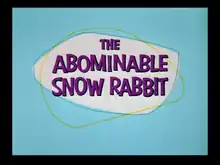| The Abominable Snow Rabbit | |
|---|---|
 | |
| Directed by | Chuck Jones Maurice Noble |
| Story by | Tedd Pierce |
| Produced by | David H. DePatie John W. Burton (both uncredited) |
| Starring | Mel Blanc |
| Music by | Milt Franklyn |
| Animation by | Ken Harris Tom Ray Bob Bransford Richard Thompson |
| Color process | Technicolor |
Production company | |
| Distributed by | Warner Bros. Pictures The Vitaphone Corporation |
Release date | May 20, 1961 |
Running time | 6 minutes, 05 seconds |
| Language | English |
The Abominable Snow Rabbit is a 1961 Warner Bros. Looney Tunes theatrical cartoon directed by Chuck Jones and co-directed by Maurice Noble, with a story by Tedd Pierce.[1] The short was released on May 20, 1961, and stars Bugs Bunny and Daffy Duck.[2] The cartoon's title is taken from the phrase and horror film The Abominable Snowman. It was the final original Chuck Jones theatrical cartoon with Daffy Duck.
Plot
Bugs tunnels through the Himalayan mountains, followed by Daffy. After a failed attempt by Daffy to go swimming in a frozen pond, the two realize that they are not at their intended destination, Palm Springs (once again, having made a wrong turn at Albuquerque). Daffy tells Bugs that he's going back to Perth Amboy and leaves.
Daffy, while underground, crashes into a creature's foot. The Abominable Snowman (whose name is Hugo, but that is not revealed in this short) grabs Daffy, names him George (a reference to Of Mice and Men, casting Hugo as Lennie Small to Daffy's George Milton), and gives him crippling hugs, believing Daffy is a rabbit, when actually Daffy just tied his swim shirt round his head for warmth, with the sleeves on top. Daffy reveals this by angrily yelling loudly ("I AIN'T NO BUNNY RABBIT!") and showing Hugo the "ears" are in fact sleeves, and Hugo proceeds to spank Daffy for "pretending he was a bunny rabbit". However, Daffy imparts to him where he can find a real rabbit, in this case Bugs. As Bugs starts experiencing Hugo's overbearing love, Daffy sneaks away. Hugo sits on Bugs, who sneaks out under the snow, carrying a monologuing Daffy towards Hugo.
As Hugo doubts that Daffy is or is not a rabbit, Daffy asks what a rabbit's distinguishing characteristics are. Hugo responds that rabbits have long ears, making Bugs tie down his own ears and stick two of his fingers behind Daffy's head as rabbit ears. After Hugo painfully hugs the duck again but realizes that he has a bill and feathers, a crippled Daffy points out the tunneling Bugs to Hugo, who chases him underground. Eager to see the incident's conclusion, Daffy follows.
Later, in Palm Springs, a profusely sweating Hugo, and a disguised Bugs, discuss Hugo's failure to catch Bugs. Hugo believes that he will not be able to see the rabbit again, but Bugs encourages him by telling him "if he loves you, he'll come back". When Daffy emerges from the hole, Bugs puts fake rabbit ears on him, causing Hugo to recognize him as a rabbit again. While Daffy is cuddled for the last time, Hugo literally melts due to the intense heat of the environment. Bugs comments, "He really was a snowman!" and Daffy, soaked in water, replies, "Abominable, that is."
Crew
- Co-Director & Layouts: Maurice Noble
- Story: Tedd Pierce
- Animation: Ken Harris, Richard Thompson, Bob Bransford & Tom Ray
- Backgrounds: Philip DeGuard
- Film Editor: Treg Brown
- Voice Characterizations: Mel Blanc
- Music: Milt Franklyn
- Produced by David H. DePatie & John W. Burton
- Directed by Chuck Jones
Voice cast
- Mel Blanc as Bugs Bunny, Daffy Duck, and Hugo
Home media
The Abominable Snow Rabbit is included on the DVD collection Looney Tunes Golden Collection: Volume 5 as well as the VHS collections Looney Tunes After Dark, Bugs Bunny: Big Top Bunny and To Grandmother's House We Go. Most of the footage was also used in the compilation movie, Daffy Duck's Quackbusters except for one part when Bugs and Daffy traveled to the Himalayas.
See also
References
- ↑ Beck, Jerry; Friedwald, Will (1989). Looney Tunes and Merrie Melodies: A Complete Illustrated Guide to the Warner Bros. Cartoons. Henry Holt and Co. p. 331. ISBN 0-8050-0894-2.
- ↑ Lenburg, Jeff (1999). The Encyclopedia of Animated Cartoons. Checkmark Books. pp. 60-62. ISBN 0-8160-3831-7. Retrieved 6 June 2020.